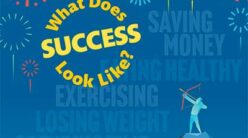In 2020, when the pandemic plunged the world into isolation, Laura Forman, a mom of four from Chicago, Illinois, found solace in online shopping. “It wasn’t a healthy coping mechanism,” she says. “I was spending money on stuff I didn’t need.”
In January 2021, Forman decided enough was enough and challenged herself to abstain from buying shoes or clothing for six months. “I realized I had to stop buying things just because they were on sale or because I thought I might wear them someday,” she says. “I wanted to focus on doing things that really brought me joy and not just things that quelled my need for instant gratification.”
Without shopping as a distraction, Laura evaluated what she already owned. She began purging her closet of clothing that no longer fit and that she didn’t like, no longer wore, or didn’t make sense for her lifestyle. “There’s only so much loungewear I need. I’m a realtor and need to dress professionally.” She ended up with multiple bags of clothing to donate. “I was shocked by how much I had.”
How did it feel at the end of the six months? “It was so freeing. That’s one thing I didn’t expect. It me made happier and has had a ripple effect in my life where I’m more conscious,” says Forman, who has also started letting her hair go gray. “I realized we have certain societal pressures to look a certain way, dress a certain way, come across a certain way—especially as women. I decided I’m going to do what makes me happy.”
Less distraction, more freedom
“When we have clutter, it’s like things are shouting at us, and it weighs us down,” says professional organizer Joanie Nicholas, owner of All Things Organized. “Clutter makes it hard to focus on any one thing. When we clear it out and have some open space, it’s easier to breathe and focus on our priorities.”
Kelsey Webb, the owner of a digital marketing agency, works out of her home and says that being intentional about her possessions and how she fills her physical space has helped her create a life that brings her joy, gives her a sense of freedom, and invites in more possibilities.
“I like to move, and I don’t want things weighing me down,” says Webb, who has moved multiple times in the past 14 years. “I like things that are natural, well-made, and have a purpose, which feels good and creates a great space to be in. When I start to get a lot of knickknacky items, it feels claustrophobic.”
Less clutter, more abudance
Ever turned your house upside down looking for your keys or phone while running late for work? If so, you understand how stressful it is when you can’t find something you need when you need it. Not only does clutter take up precious mental and physical space, it costs us time and money. One survey found that Americans spend $2.7 billion each year replacing lost or misplaced items.
Forman estimates she saved at least $1,000 during her buying blackout, and she enriched her life with more personally rewarding activities. “I got back to basics in terms of the things that really feed me,” says Forman. “I did a lot of reading and reconnecting with the people in my life. I made plans to take my kids skiing. I spent time outdoors. I remembered what I loved to do instead of filling that time with that dopamine hit of shopping.”
Webb says she was fascinated by the tiny house movement for many years but wondered if it would feel like a compromise. “I got caught up thinking that living in a tiny house and living with less meant I would have to live a small life. And that isn’t the case,” she says. “I fill my life in other ways, through experiences, adventure, friendship, and through the work I do. When I’m not defined by the things in my life, I can be whoever I want to be.”
In addition to feeling a greater sense of personal abundance, when our space is organized, we’re more likely to feel more generous toward others. In a study published in Psychological Science, volunteers were paid to fill out questionnaires in either an organized workspace or a disorganized workspace. Afterward, both sets of volunteers were asked if they wished to donate items to a specified charity. The ones who worked in the tidy space donated more generously.
Less excess, more nourishment
According to researchers at Johns Hopkins Bloomberg School of Public Health, people who mostly eat home-cooked meals are more likely to eat healthier and consume fewer calories than people who frequently dine out. If one of your goals is to clean up your diet, look for ways to trim excess “fat” from your kitchen. Do you need drawers full of single-purpose kitchen gadgets, like garlic presses or avocado slicers, when a good knife will do?
“When you can access all the tools you need to make a healthy meal and there’s room on your countertop for a cutting board and knife to chop vegetables, you’re going to eat more healthfully than if your counters and cabinets are jam-packed and you just want to order out,” Nicholas says.
Sleep is another essential component of good health. A clean, organized bedroom helps you wind down at night. “If the last thing you see before falling asleep is a tidy bedroom, you’re going to sleep better than if you fall asleep looking at clutter that’s stressing you out,” says Nicholas.
Less baggage, more boundaries
Because Webb is mindful of what she brings into her space, she refuses to feel pressured to fill every nook and cranny in her home. Nor does she feel guilty when it’s time to pass along something that no longer serves a purpose or brings her joy. Her approach extends to gift giving.
Webb says she isn’t shy about communicating her boundaries to her loved ones. “My family knows I’m not picky, but I am intentional. I always appreciate people desiring to contribute to me, and I also give myself permission to regift or return gifts that don’t feel like me.”
Of course, regifting and returning gifts isn’t easy. We worry about hurting people’s feelings and feel guilty about letting go of gifts or family heirlooms, even if they don’t fit our lifestyle, taste, or vision for our home. If you find yourself in this well-populated camp, Nicholas suggests a shift in perspective.
“Think about the ways you’re storing gifts and heirlooms,” Nicholas says. “Are you honoring your family member’s memory by packing heirlooms away in a basement closet or in boxes at a storage facility? With gifts you don’t use and heirlooms you don’t love, get them out in the world to people who will love them and use them. That’s honoring the gift, the gift giver, or the deceased loved one more than letting the stuff weigh you down.”
And what about those items you think you might need someday but haven’t touched or looked at in years? Nicholas suggests taking an “honest, critical” look at your possessions. “If you haven’t needed it yet, what will cause you to need it? And is the space you’re going to gain worth the risk that maybe you’ll need it someday?”
Less chaos, more peace
While it’s tempting to embark on an organizing project by buying colorful organizing tubs or a fancy closet system, take a minute. “Don’t buy containers before you know what you need,” Nicholas says. Otherwise, you can get stuck with bins and systems that aren’t the right size, fit, or function for the space. Instead, start with a strategy:
1. Ask yourself, How will my life be better when I have less stuff? What is my clutter keeping me from doing? The answers to these questions will keep you motivated.
2. Envision what your space could look like or how it could be used differently. Rather than having craft items scattered all over the house, could one closet or room be reimagined into an arts and crafts space?
3. Declutter bit by bit to avoid being overwhelmed. The path to victory is paved with small wins. Start with a drawer or closet and remove the no-brainer items before moving on to possessions you’re unsure about.
There’s no question that between technology and the demands of modern life, the world is a noisy place. However, that doesn’t mean your home has to be. “We are so bombarded with information and things to do that our brains are on overload,” Nicholas says. “When you only have what you really need, use, and love in your space, your brain doesn’t have to work as hard. It’s like your home is a vacation from the craziness of the world.”
Health and wellness writer Christa M. Hines is on a mission to simplify her life and embrace more joy every day.






